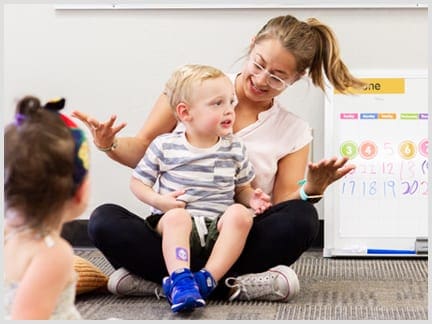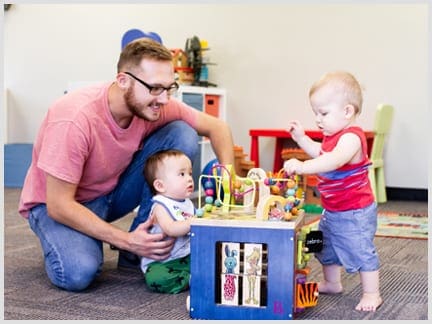
Providing a nurturing and engaging environment is essential for the development of Autistic children. At Kindred Kids, we believe in fostering growth through early intervention for autism, ensuring that children and their families feel supported in their journey. Play is a natural and powerful tool that enhances learning, communication, and social skills in a way that feels enjoyable and motivating. By creating a playful environment tailored to the unique needs of each child, we can cultivate confidence, independence, and a strong foundation for lifelong learning.
The Importance of Play in Early Development
Play is at the heart of every child's learning experience. It allows children to explore, express themselves, and build connections with others. For Autistic children, structured yet flexible play-based learning is particularly beneficial. Through play, they can develop essential social and communication skills while also enhancing their cognitive and motor abilities.
At Kindred Kids, we use the Early Start Denver Model (ESDM), an evidence-based approach that integrates play with developmental and social learning strategies. This approach ensures that learning is embedded within everyday interactions, making it a natural and enjoyable process for the child. Our focus on play-based intervention helps children engage with their surroundings and develop a sense of confidence in their abilities.
Creating a Playful and Supportive Environment
A playful environment is one that is structured yet adaptable to the child's individual needs. Here are key elements to consider when designing a space that fosters learning and growth for Autistic children:
1. Sensory-Friendly Spaces
Many Autistic children experience sensory sensitivities, which can impact their ability to engage in play and learning activities. A well-designed environment considers factors such as lighting, noise levels, and textures to create a comfortable and welcoming space. Soft lighting, designated quiet areas, and sensory-friendly materials can help reduce anxiety and encourage participation.
2. Structured Play with Flexibility
While structure provides predictability and security, flexibility allows for creativity and exploration. Using visual schedules, designated activity zones, and clear expectations can help children feel more comfortable and engaged. At Kindred Kids, we ensure that each play-based session is tailored to the child's interests, making learning enjoyable and meaningful.
3. Encouraging Social Interaction
Building social skills is a crucial aspect of early intervention for autism. Play provides a natural opportunity for children to practice turn-taking, sharing, and cooperative play. Group activities, such as sensory play, role-playing, and interactive games, help children develop social connections in a fun and supportive setting. Encouraging peer interactions within a structured environment can significantly enhance social development.
4. Incorporating Special Interests
Autistic children often have deep interests in specific topics or activities. Using these interests as a foundation for play can make learning more engaging and effective. Whether it's trains, animals, or music, incorporating a child's passion into play-based activities fosters motivation and participation. This individualized approach aligns with the principles of the Early Start Denver Model, which focuses on leveraging a child’s natural curiosity for developmental growth.
5. Parental Involvement in Play-Based Learning
Parents play a vital role in their child's development. At Kindred Kids, we emphasize the importance of family involvement by equipping parents with strategies to support their child's learning at home. Through parent coaching and guided play sessions, families can incorporate play-based techniques into daily routines. This not only strengthens the parent-child bond but also reinforces skill development beyond intervention sessions.
The Role of Early Intervention in Play-Based Learning
Early intervention for autism is essential in maximizing a child's developmental potential. Research has shown that early, intensive, and evidence-based intervention significantly improves outcomes for Autistic children. The Early Start Denver Model (ESDM) is one of the most effective frameworks for supporting early development through play.
By embedding learning into everyday interactions, ESDM helps children improve their communication, cognitive abilities, and social skills in a naturalistic manner. At Kindred Kids, we use this model to create engaging, individualized programs that cater to each child's unique strengths and needs.
Overcoming Challenges in Play-Based Learning
While play is a powerful tool for development, there can be challenges in engaging Autistic children in play-based activities. Parents often face difficulties in finding the right approaches to support their child’s engagement. Understanding the connection between autism and parenting can help caregivers create meaningful play experiences that cater to their child's unique needs. Here are some common challenges and strategies to overcome them:
In conclusion,Creating a playful environment that supports the development of Autistic children requires a thoughtful, individualized approach. At Kindred Kids, we are committed to providing early intervention for autism that is engaging, evidence-based, and family-centered. Through play, children can develop essential life skills while feeling safe, supported, and empowered.
By incorporating sensory-friendly spaces, structured yet flexible activities, and family involvement, we ensure that children thrive in a nurturing environment. With the guidance of the Early Start Denver Model, we continue to champion play as a fundamental aspect of learning and development. Together, we can create a world where every child has the opportunity to grow, learn, and belong.
For more information on how Kindred Kids can support your child’s development, reach out to speak with an Early Intervention Practitioner today.



































